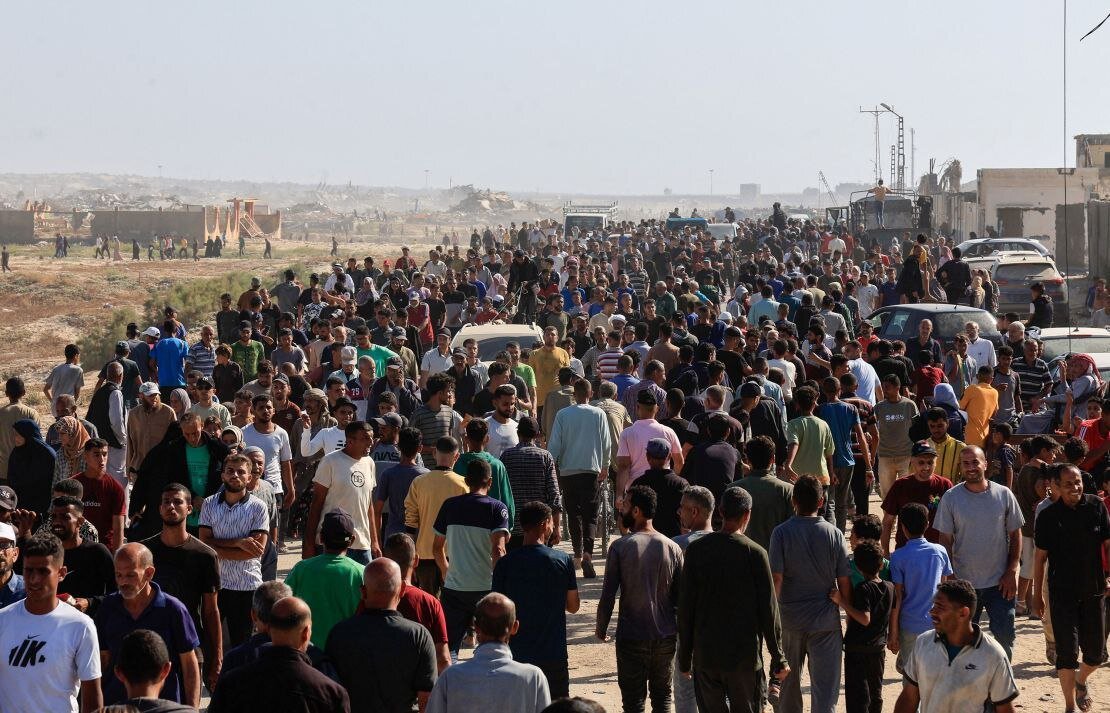Outcry over U.S.-Israeli aid mechanism

TEHRAN – An aid delivery system set up by a U.S.-backed company in Gaza crumbles, triggering international condemnation.
The American firm tasked by the Israeli occupation regime with distributing food in the besieged enclave quickly lost control of the sites.
On Tuesday, mass stampedes and severe overcrowding occurred near Rafah on the first day of operations. The following day, Israeli gunfire targeted Palestinians in the area, resulting in the death of one starving civilian and injuries to around 50 others.
The ensuing chaos left the site heavily damaged and forced an abrupt halt to distribution.
Eyewitnesses and media reports described scenes of desperation, with hundreds of thousands of starving Palestinians swarming the area after being cut off from essential supplies for nearly 90 days.
Amid the disorder, Israeli occupation forces (IOF) opened fire near the distribution point. Reporters on the ground say IOF helicopters and tanks also fired on crowds at the aid hub.
Hebrew media later confirmed the military “fired heavily” as Gazans rushed the compound. Reports from Yedioth Ahronoth stated that security staff contracted by the American firm abandoned the site, overwhelmed by the surging crowds.
The breakdown prompted immediate backlash from the Government Media Office in Gaza, which labeled the entire initiative a “systematic policy to perpetuate starvation.”
In a scathing statement, the office said the images of desperate Palestinians “taking food under the crushing weight of lethal hunger” exposed the “complete collapse of the so-called humanitarian process.”
“This is irrefutable evidence of the occupation’s failure to manage the humanitarian catastrophe it deliberately created,” the office added, denouncing the use of aid as “a weapon of war and political extortion.”
The statement went on to reject any form of humanitarian access that involves buffer zones or corridors controlled by the IOF, urging the UN to immediately open unrestricted crossings and allow independent relief operations.
International reaction has also been swift and sharply critical.
The United Nations called the scenes at the so-called Gaza Humanitarian Foundation (GHF) site “heartbreaking.”
The spokesperson for Secretary-General Antonio Guterres stated that the U.S.-Israeli model of aid delivery fails to meet basic humanitarian principles of independence and impartiality.
UN aid officials added that what’s urgently needed is the reopening of all border crossings and unrestricted access for established humanitarian agencies.
Ahmed Bayram of the Norwegian Refugee Council (NRC) urged the U.S. and Israel to abandon the initiative entirely. “This is not aid,” he said.
“It is a performance of suffering. An occupying power that razes Rafah and then invites people back to beg for rations has no moral authority to lead humanitarian operations.”
The UN humanitarian office echoed those sentiments. Spokesman Jens Laerke described the measure as “a distraction” that politicizes assistance, warning of its failure as famine looms in Gaza.
Juliette Touma, communications director of the UN Palestinian refugee agency, said that it had large medical shipments waiting that have been denied entry into Gaza.
“We have over 3000 trucks, not only of food, but also medicines that are lining up in places like Jordan, like Egypt, that are waiting for the green light to go in, and they’re carrying medicines and that is expiring soon,” she said.
UN aid chief Tom Fletcher previously called the mechanism “a fig leaf for further violence,” emphasizing that it violates international norms and undermines longstanding humanitarian protocols.
Reports revealed that the GHF’s widely publicized food parcels were paltry and nutritionally insufficient.
As Palestinians streamed through military checkpoints in a desperate attempt to find food, the humanitarian crisis deepened.
The sound of gunfire mixed with the cries of hungry civilians underscored the stark collapse of the U.S.-Israeli aid plan, an initiative many now view not as relief, but as yet another instrument of siege.
Leave a Comment